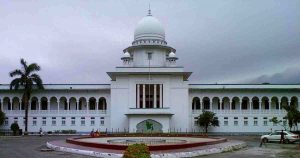Masum Billah
Following the sad and terrorist incident in the Holy Artisan Hotel at Gulshan a widespread discussion concentrating on English Medium School and Private University education has been in the fore. It is also observed that some quarters have been trying to undermine or humiliate English Medium Schools without delving deep into the real details. It can be guessed and sensed that a great misunderstanding has developed between English Medium and other medium of education in the country.Government distributes books free of cost to all the students belonging to Bengali Medium and a certain portion of the students get stipend and the more brilliant ones enjoy special scholarships.
Government school teachers get their full salary and benefits and non-government school teachers also enjoy hundred percent monthly’ salary along with some other benefits. While English medium school teachers get not a single penny from the government. Government also establish the infra-structure of many Bengali medium schools. The facilities department of the ministry of education also establish laboratories and extend sanitary facilities in Bengali medium schools irrespective of rural and urban schools. English medium schools stand miles apart from enjoying any of these state facilities. On the contrary, the students of English medium are to pay seven and a half percent VAT to the government along with their already high tuition fees. These pictures surface the serious discrepancy between Bengali Medium and English Medium education.
Still some quarters are seen to be vocal enough and pressing the government to do something against English Medium Schools. Reason, may be due to the lack of sound communication between the mainstream education and this medium. They say that the government has played the role of silence to take any action against English Medium Schools which creates wider opportunity for the English Medium School authorities to raise the admission, tuition and other fees according to their sweet will. The absence of proper policy guidelines even the latest education policy does not reflect any clear and sound guidelines to run this medium of education has made this scope wider. No proper and central body or authority exist to take any remedial measures to minimize the ills lying in this medium of education and the guardians also cannot place or lodge any complaints against the irregularities taking place here. This is true that many English Medium schools charge high tuition fees without any valid explanation. In this regard G.M. Nizam, secretary of Bangladesh English Medium School Association and Managing Director of Cardiff International School says, “It is better to have principles and guidelines to run English medium schools. But we must be involved while developing such guidelines to make it a fact based document. An English medium school charges fees according to the standard of the school. How the schools will run if the fee is reduced five times lower than its standard?” He continues,” It is a fact that Bangladeshi students receive education here. They uphold the art, culture, and the values of this country. So, we also want to be in the educational framework of the government.” These comments and remarks retain merit. When developing guidelines for running English Medium Schools, the relevant people must be included there otherwise only the bureaucrats of the ministry or the Education Board officials will develop a questionable policy guideline.
A glaring example of it stands before us. Under Registration of Private Schools Ordinance-1962 Dhaka Education Board developed a policy in 2007. They now say it was not appropriate. It did not say clearly anything about tuition fee and other financial matters. It recommended to give temporary approval to a school for two years. Then again for 2-5 years approval in case of its performing better which will be determined on the basis of activities and close observation.
There was no provision for giving permanent registration to this medium of schools It had provision to submit reports every five years but no provision for establishing schools in rented houses.
No exact data regarding the number of English Medium students and institutions is available which further proves a serious negligence shown towards education in general and English medium education in particular. According to the report of the ministry the number of English Medium Schools is 159 with 64 thousand 507 students. Out of them, the ‘O’ Level schools is 64, ‘A’ Level 54 while Junior Level 41. Out of these schools Dhaka Education Board has given approval to only 102 schools. But Bangladesh English Medium School Association gives another figure which tells the number of English Medium Schools in Bangladesh is 350 which accommodate more than 3 million learners.
After the High Court order Dhaka education board hastily developed a rough policy regarding English Medium Schools as per the demand of education ministry which was submitted to the court. Several meetings and one workshop were also held on the rough policy. According to that rough policy English medium schools of the country have been divided into three categories. The schools which accommodate 700 or more students and offer quality education, quality teachers and suitable educational environment and infra-structure along with other related facilities are available will belong to ‘A’ category. Their tuition and session fee in metropolitan cities will be highest Tk 30 thousand and out of the city area it will be Tk 15 thousand. And monthly tuition fee in these schools will be Tk 3 thousand and outside the city Tk 1500.The schools having 400-
700 pupils will fall in ‘ B’ category and in metropolitan or big cities the admission and session fee of these schools is to be fixed Tk 18000 thousand and beyond big cities Tk 7000. Monthly tuition fee of these schools of metropolitan cities will be Tk 2 thousand and outside one thousand. The schools with less than 400 pupils will be in the ‘C’ category and these schools of metropolitan cities can take at best eight thousand taka and outside big cities four thousand taka as admission fee and monthly tuition fee Tk 1500 highest and beyond the cities Tk 800.
Admission form can be sold in metropolitan cities for Tk 500 and outside Tk 300. As English Medium Schools don’t enjoy any state facilities whereas their education is very costly. So, they must take higher amount of tuition and admission fees from the students but the practical scenario shows that today most of the students of English Medium are from middle class and lower middle class guardians. They cannot afford to pay the existing higher cost of this medium.
In that case we can follow the examples of cadet colleges. In cadet colleges tuition and other fees are determined on the basis of the guardians’ income. English Medium schools can introduce this kind of system which will open opportunity to receive this qualitative education by the middle and lower middle income group guardians and the ministry of education should take a sound step in this regard.
Today many guardians opt for sending their children to English medium schools. Several factors contribute to set this trend in motion. The first one is English medium students naturally develop their base in English strongly which is an essential factor to find jobs both at home and abroad in this age of globalization. Seeking admission in foreign or good universities in the country put serious emphasis on the skills of English. The students of Bengali medium with rare exceptions obtain higher grades without any sound footing in English. Again English medium students become more creative as their assessment is conducted by international examination bodies which put more emphasis on creativity. The books developed and written by the foreign writers are really more creative than the texts we develop in our country. In the name of creative questions in Bengali medium we have created a mess actually and now we are planning to make it further creative. But English Medium Schools prove superior in this regard though they have some other follies. Now is the time to minimize the gaps developed, not to criticize and corner a potential sector of education.
(Masum Billah works in BRAC Education Programme as an specialist and writes regularly on various national and international issues)




